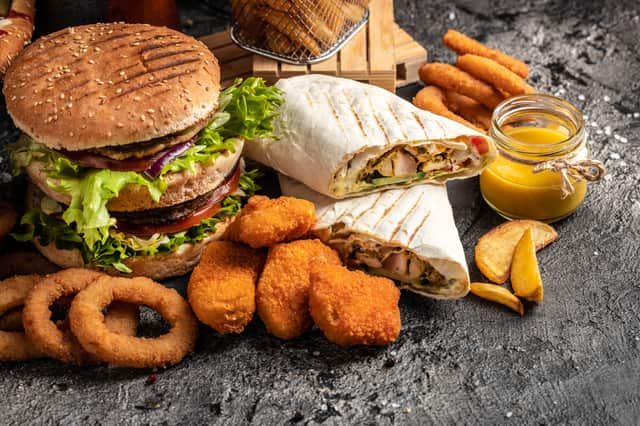Health experts call for ultra-processed foods to be treated "like cigarettes" and which foods are the worst


Experts have called for junk food to be treated like cigarettes after they found ultra-processed food was linked to more than 30 damaging and deadly health outcomes.
An overview of 14 studies involving nearly ten million people found that the food could cause cancer, heart problems, type 2 diabetes and even depression and anxiety. In total the researchers found ultra-processed food was consistently associated with an increased risk of a total of 32 adverse health outcomes.
Advertisement
Hide AdAdvertisement
Hide AdResearchers found those with a higher intake of ultra-processed food were a fifth more likely to die from any cause. The authors of the study, published in the BMJ, urged member states of the United Nations (UN) to urgently impose rules on junk food advertising similar to those on tobacco products.
Ultra-processed foods such as packaged baked goods, crisps, fizzy drinks, sugary cereals, ready meals and fast foods such as burgers and pizza undergo multiple industrial processes and often contain artificial colours, emulsifiers, flavours and other additives. These products also tend to be high in added sugar, fat and/or salt, but low in important vitamins and fibre.
These junk foods can account for nearly 60 per cent of total daily energy intake in some high-income countries such as the UK and the US, whilst their consumption has also rapidly increased in many low and middle-income nations in recent decades.
Though these foods are some of the worst in terms of health, they are often cheaper than healthier food products and far quicker and easier to prepare.
Advertisement
Hide AdAdvertisement
Hide AdDr Melissa Lane, an associate research fellow at Deakin University and lead author of the study, said: "Overall, direct associations were found between exposure to ultra-processed foods and 32 health parameters spanning mortality, cancer, and mental, respiratory, cardiovascular, gastrointestinal, and metabolic health outcomes. These findings support urgent mechanistic research and public health actions that seek to target and minimise ultra-processed food consumption for improved population health.
"Coupled with existing population-based strategies, we recommend urgent mechanistic research and the development and evaluation of comprehensive population-based and public health strategies, including government-led policy frameworks and dietary guidelines, aimed at targeting and reducing dietary exposure to ultra-processed foods for improved human health.
"Multidisciplinary investigations are needed to identify the most effective ways to control and reduce ultra-processing and to quantify and track the cost-benefits and other effects of all such policies and actions on human health and welfare, society, culture, employment, and the environment."
Here are 30 examples of ultra-processed foods that you should consider removing from your diet:
Advertisement
Hide AdAdvertisement
Hide Ad- Sugary breakfast cereals
- Instant noodles
- Chicken nuggets
- Frozen pizza
- Microwaveable popcorn
- Crisps with artificial flavours
- Cookies
- Biscuits
- Chocolate bars
- Flavored yogurt
- Soft drinks and sugary fruit juices
- Pre-packaged deli meats
- Ready-made cake and brownie mixes
- Pre-made icing
- Packaged macaroni and cheese
- Sandwich spreads
- Flavoured coffee sachets
- Breakfast bars with added sugars and additives
- Whipped cream
- Frozen waffles and pancakes
- Instant pudding mixes
- Processed cheese
- Bottled salad dressings
- Boxed cake mixes
- Fruit-flavored sweets
- Frozen breaded chicken tenders
- Energy drinks
- Pre-made smoothie mixes
- Packaged soups
- Instant mashed potatoes
Researchers concluded that public policies and action on ultra-processed foods are essential in lessening their consumption. These include front-of-pack labels, restricting advertising and prohibiting sales in or near schools and hospitals.
The researchers also called upon United Nations agencies, along with member states, to develop and impose rules on ultra-processed foods similar to those placed on tobacco products.
Comment Guidelines
National World encourages reader discussion on our stories. User feedback, insights and back-and-forth exchanges add a rich layer of context to reporting. Please review our Community Guidelines before commenting.
